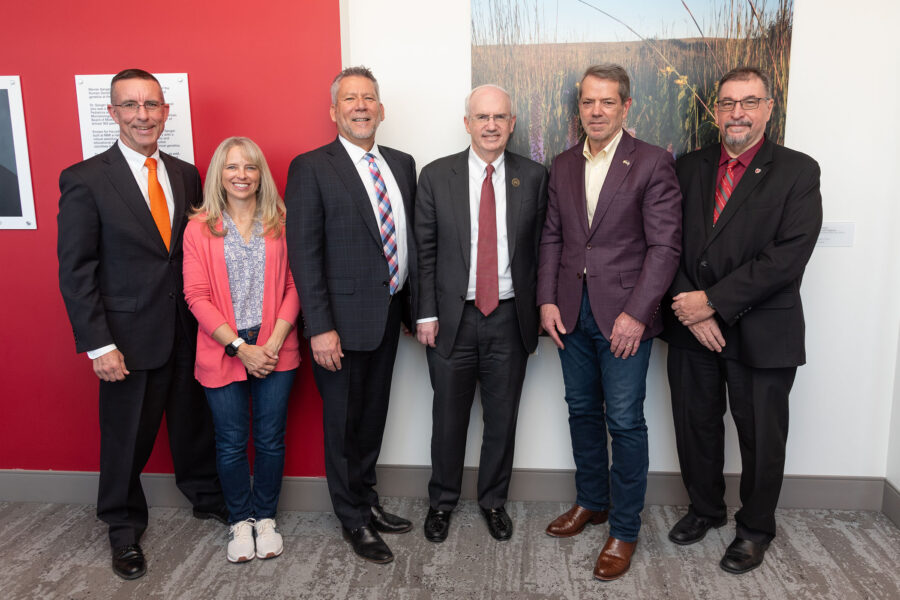Gov. Jim Pillen last week joined leaders from the Nebraska Department of Health and Human Services (DHHS), UNMC and advocates in announcing the elimination of the Developmental Disabilities (DD) Registry to better support Nebraskans with intellectual and developmental disabilities (IDD).
“This is a breakthrough way to reimagine how services are offered to individuals with IDD in Nebraska and save taxpayer dollars,” Gov. Pillen said. “This is the first time in Nebraska history the DD Registry will be eliminated, which is a huge step forward to ensure all Nebraskans have the opportunity and support to live the Good Life.”
Historically, the DHHS Division of Developmental Disabilities (DDD) has maintained a registry for developmental disability service waivers. The registry serves as a waitlist for individuals who want to be enrolled in the Comprehensive DD waiver program, but cannot be enrolled due to limited funding.
The state’s new approach will provide a full continuum of care that adapts to individuals’ changing needs as they age. It will include:
- Medicaid for DD-eligible children that meet the required level of care.
- Additional access to family support and day services waivers that allow families to live together.
- Case management services for individuals that do not require waiver services.
- Employment services.
- Comprehensive DD waivers based on a needs assessment developed by DHHS with the support of stakeholders.
“It is the mission of DHHS to care for and enrich the lives of vulnerable Nebraskans by offering services at the time support is needed. The elimination of the registry will enhance the full continuum of care for individual with IDD and build stronger and healthier communities,” said Steve Corsi, PsyD, CEO of DHHS.
Eliminating the DD Registry offers individuals with IDD and their families access to support to help them achieve their goals, be active members of their communities and live a meaningful life.
“The elimination of the current registry will enhance the support for individuals and families impacted and will promote self-independence and self-determination. Access to resources improves the health and well-being of the individual receiving care, their families, caregivers, and others in their community,” said Jeffrey P. Gold, MD, chancellor of UNMC.
Earlier this month, Gov. Pillen proclaimed March as Developmental Disabilities Awareness Month in Nebraska. It’s a time to celebrate the achievements made by and for individuals with IDD.
“On March 1, the Division of Developmental Disabilities launched the Family Support Waiver, which laid the framework to eliminate the DD Registry by providing services to over 800 children ages birth to 21 years old with intellectual or developmental disabilities with the goal of allowing families to live and grow together,” said Tony Green, director of DDD. “I cannot think of a more exciting way to close out Developmental Disabilities Awareness Month than to announce the elimination of the DD Registry, as this month is about celebrating the accomplishments of folks with IDD and the folks that offer services and leadership to the DD community.”
The news conference on March 28 was hosted by the Munroe-Meyer Institute (MMI), an institute within the UNMC enterprise that has earned designation as a University Center for Excellence in Developmental Disabilities.
“The Munroe-Meyer Institute strives to transform the lives of individuals with disabilities and special health care needs through comprehensive clinical services, community engagement, education and research,” said Karoly Mirnics, MD, PhD, director of the Munroe-Meyer Institute. “We provide care at more than 40 locations across Nebraska. MMI is a premier resource for individuals and families and is committed to training health care professionals who provide care to children and adults with disabilities.”
The elimination of the DD Registry will include new models of staffing, including telehealth, virtual support and the expansion of independent providers. The new policies are expected to be rolled out over the next 12 to 18 months.
For more information on programs for individuals with IDD, or to apply for services, please visit the DDD website at this link.
